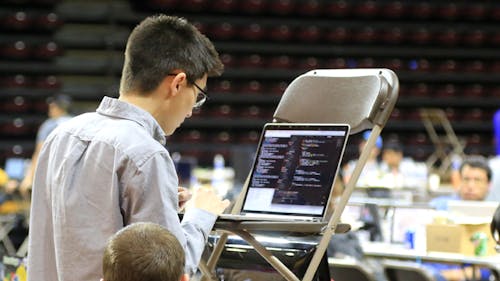HackRU Spring 2015 hosts more than 1,000 participants

Many may find it fitting that the Spring 2015 edition of HackRU culminated on the 50th anniversary of Moore's Law.
The 24-hour hackathon took place April 18 to April 19 at the Louis Brown Athletic Center on Livingston campus, gathering a crowd of more than 1,000 people, according to event organizers.
Moore’s Law is the observation that the number of transistors on computer processors doubles every two years, according to Intel. Sunday was the 50th anniversary of the article published by Gordon Moore that first quantified the rapid expansion of computing potential.
HackRU’s benefits do not mimic Moore’s Law, but the hackathon has experienced an increase in attendance over the last few years. After HackRU Spring 2014, Eddie Zaneski graphed the growth of HackRU on his blog, demonstrating how quickly the hackathon’s scale grew.
“At the first HackRU, there were more pizza boxes than participants,” said Jade Yee, a School of Environmental and Biological Sciences senior and a lead organizer of the event.
The first Rutgers hackathon happened four years ago during the Spring 2011 semester in a lecture hall at Hill Center on Busch campus with about 50 attendees, said Michelle Chen, a School of Arts and Sciences sophomore.
HackRU’s growth has been natural and a little bit spontaneous, Chen said. Four years later, HackRU now attracts hundreds of people from Rutgers, other universities and local high schools.
“We’ve never set a goal where we want this or that many people to attend," Chen said. "We just kind of throw a hackathon, see how many people register for it, and then we work with those numbers. People just keep getting more interested in these kinds of events and showing up.”
Nearly one-fourth of those attendees were students from high schools, Chen and Yee said.
Chen and Yee both raved about the connection they have with HackRU, and the people who attend. The HackRU team is a family, they said.
There is much more to HackRU than programming, Yee said. There were human-sized hamster ball races, karaoke, cup stacking, trivia games, a Super Smash Bros. tournament and more.
Late-night coffee was provided by local coffee shop Hidden Grounds, food was provided by King Pita and Jimmy Johns, as well as a late-night ice cream station complete with chocolate syrup and other important toppings.
If that was not enough for hungry hackers, there was a midnight pig roast provided by Noodle Go Go.
While HackRU is primarily a learning experience, there is also a competitive side to it.
Judges chose the top ten projects, and the top five demonstrated their hacks in front of attendees. The judges then chose the top three, who won various prizes including Pebble smartwatches and tablets.
First place went to Litecase, an app that converts video to ASCII code using text to create an image of what the camera sees, built by Sandile Keswa, Vuk Petrovic, Dan Cadden and Ryan Yurkanin.
Second place went to CloudFish, a system that lets users remotely feed a fish. Chris Leung, William Browder-Little and Brad Totaro used 3D-printers and a Raspberry Pi to create a system that accomplishes tasks from anywhere in the world.
Third place went to Share.el, an app created by Daniel Bordak that lets users share code directly from a text editor through email or text messages.
While many may consider the growth and number of people at HackRU to be exciting, Chen said there are some downsides.
“When you hold events at a huge scale, you lose some of the things that make smaller events so great,” Chen said.
Larger events also tend to be more competitive, because some students want the prestige of saying they won first-place at a hackathon, Chen said.
Competition isn’t the main goal of HackRU, Yee and Chen said. Prizes weren’t posted until right before the hackathon.
“We didn’t want people to go into this thinking, I want to win that thing," Chen said. "We want people to work on an idea and then see where it goes from there.”
HackRU is what you make of it, Yee and Chen said. What makes HackRU such a great event is its flexibility, and that's why the number of attendees has continued to grow over the past few years.
“We don’t try to go into HackRU with any one theme in mind,” Yee said. “Actually, that’s not entirely true — our main goal is to be kickass.”
Nikhilesh De contributed to reporting for this article.



